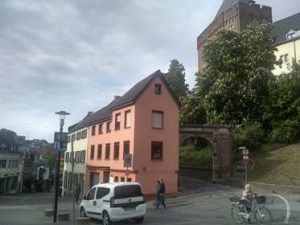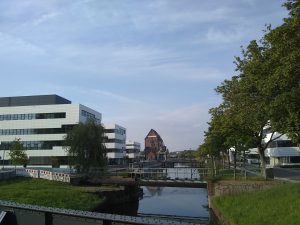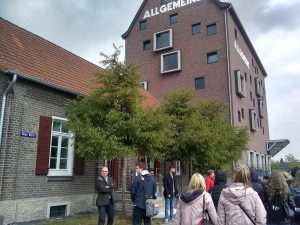6th May – 10th May 2019. By David McQueen
Rhine-Waal University (RWU) is the only state university in Germany currently offering a BA in International Relations taught entirely in English. Dr. David McQueen recently went to see the university and discover if the programme might be a good match for BU Politics students seeking further study abroad opportunities – which are currently oversubscribed. This is his report.
Introduction
Following initial contacts with Rhine-Waal University (RWU), and after securing Erasmus Funding with the assistance of Global Mobility, I attended the International Week (6th May – 10th May 2019) at RWU to help assess the possibility of establishing a staff-student exchange with Bournemouth University for the BA Politics programme. RWU is a young university established in 2009 which has grown rapidly from 60 to 7,300 students in ten years. It has a range of Bachelor and Masters programmes taught in four faculties: Life Sciences; Technology and Bionics; Communication and Environment; and Society and Economy where the BA in International Relations (IR) is taught.
Kleve and RW Campus
RWU is a split campus university with a campus in Camp-Lintfort and the town of Kleve. International Relations is taught on the Kleve campus in the attractive, brand-new site located on both sides of the canal in the centre of town. Kleve is a small, very quiet town with a population of 53,000, located in a rural area of Germany close to the Dutch border. Kleve is clean, safe and attractive, with an excellent network of wide, well-signposted cycle lanes across the town and connecting the neighbouring areas, pleasant walks, a good selection of shops and local amenities including an extensive park and a small zoo.

The castle overlooking the quiet streets of Kleve
English is predominant language at RWU
The language of instruction in the Politics programme and across 78% of the other degrees is English. German is not required to study or navigate around the university where English is spoken by all staff and students. This is extremely unusual for a German university and makes it a unique selling point for international students who comprise almost 50% of the student body. Furthermore, RWU offers the only IR programme taught only in English in Germany, a compelling factor in exploring the possibility of an exchange programme there. In the town English is widely, but not universally, spoken and it is strongly recommended that exchange students take the opportunity to study German which is offered by the university at all levels (from basic to advance) free of charge.

RWU campus in Kleve straddles the canal
Student Support and the Campus
During the International Week I met staff and student advisors at the Welcome Centre which provides a range of services for students. There is a good level of support for international students coping with a range of issues from visas (not yet an issue for UK students) and bureaucracy to cultural understanding, orientation and career advice. There are a number of excellent methods practiced at RWU for integrating international students into the student body and providing equal opportunities and offering safe, supportive space and resources for cultural exchange is apparent.
There was a tour of the small, but spacious and well-resourced campus. This has the advantage of being newly built and showcasing up-to-date facilities and technology. The campus is thoughtfully planned and comfortable for the student and staff population with the capacity to take more students as the university grows.
The library is laid out in a renovated harbour storage building . This is a striking, four-floor space at the heart of the campus and characterises the university’s effort to preserve distinctive aspects of the area’s industrial heritage in the newly built campus.

The library is located in a renovated quayside warehouse in the centre of the campus
The International Relations Programme
I met with Dr Anne Tempel, Prof. Phillip Schorn (Vice Dean of International Affairs and Faculty of Society and Economics), Prof. Jacob Lempp and Prof. Alex Brand who lead and lecture on the Politics programme. The IR programme, which has a strong political science and economics foundation, is composed of around 60% German and 40% international students. It is a popular programme and exceeds its limit of 72 new students per year so it is a ‘restricted entry’ programme with high quality, motivated students.
I also attended an excellent IR lecture by Prof. Jacob Lempp on the first year the International Affairs unit. This was a large cohort of 60 or 70 student – who were focused and showed excellent engagement is the review and Q&A section. The lecture on ‘Milestones to the Cold War’ covered some major points in the development of international order from the Treaty of Westphalia to the Cold War. It was very clearly and concisely delivered and was pitched at the level of the students – and while this would not be a challenge to A Level students of History, it showed the high level of expectation set in the lecture sessions
Kamp-Lintfort Campus
I met with the IR students and gave a presentation on Brexit in their Analysis of Political Crisis elective. The Q&A showed these were very engaged students with a good level of English and understanding of global affairs.
I also travelled 60km to the Kamp-Lintfort Campus – another new and attractive campus, some of which is contained in renovated industrial and mining buildings. As in Kleve there is extensive evidence of building and renovation in the town and by the campus and there are ambitious plans for disused mining and industrial infrastructure which are in the process of being realised.
RWU has a strong focus on developing career opportunities and has schemes to encourage local entrepreneurship by working closely with local businesses and start-ups in creative partnerships through structured workshops and competitions. RWU has the largest FabLab in Germany (part of a network of FabLabs around the world) which is an open access learning and production space where students can bring ideas for products and get help in developing these into computer models and designs. These can then be made in the lab using materials of all kinds (including wood, plastic and foodstuffs).

RWU’s FabLab is the largest in Germany
And the end of an interesting, full and informative week I would not hesitate in recommending RWU for our Politics students. The facilities, standard of care, quality of education offered and opportunities to explore an interesting (if rural) area close to the Dutch border and within striking distance of some larger towns within Germany make this a unique exchange opportunity. The IR programme is rigorous and solidly constructed, the students are motivated, bright and engaged and the exchange opportunities are varied and well worth pursuing for capable and committed students. These students should not intimidated by the prospect of exam-based assessment, and should be prepared for a tranquil, English-language medium exchange experience amongst a diverse student population at a young and well-resourced university with a high standard of education on offer.







